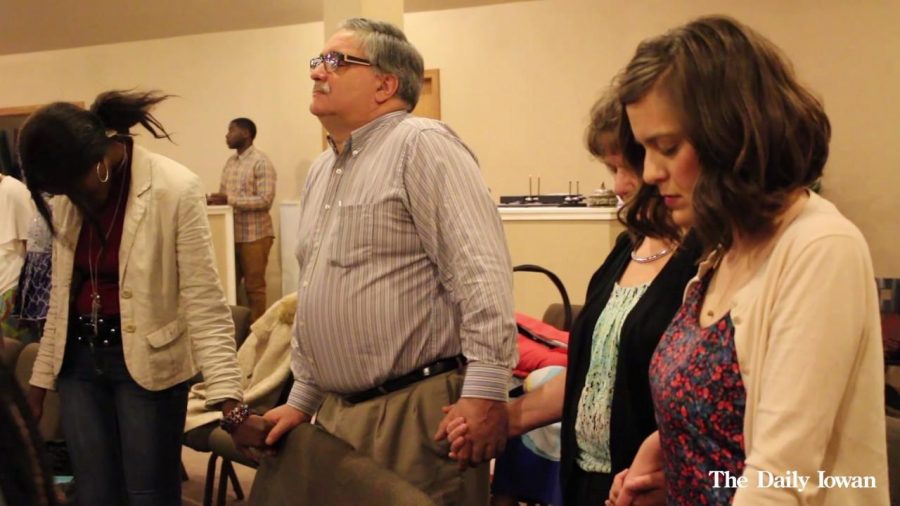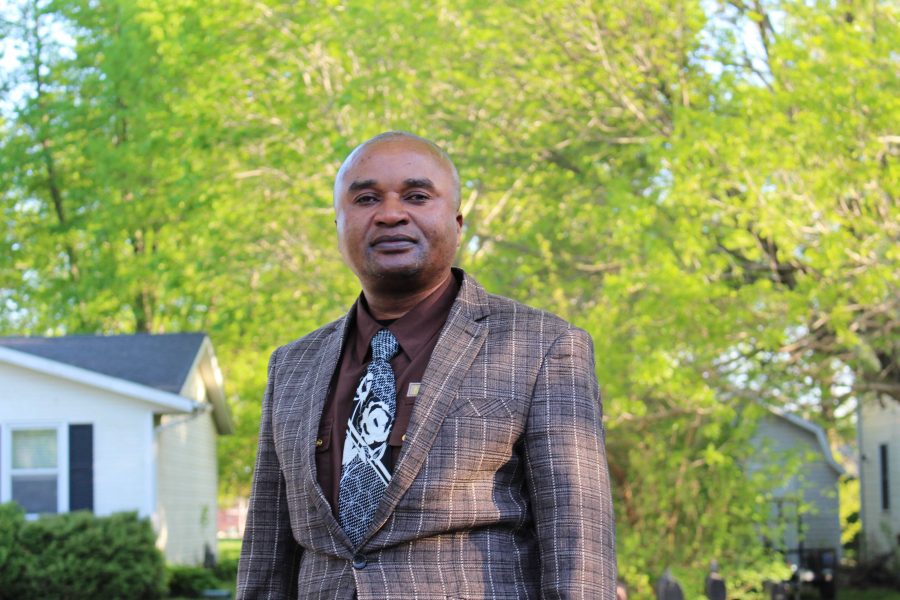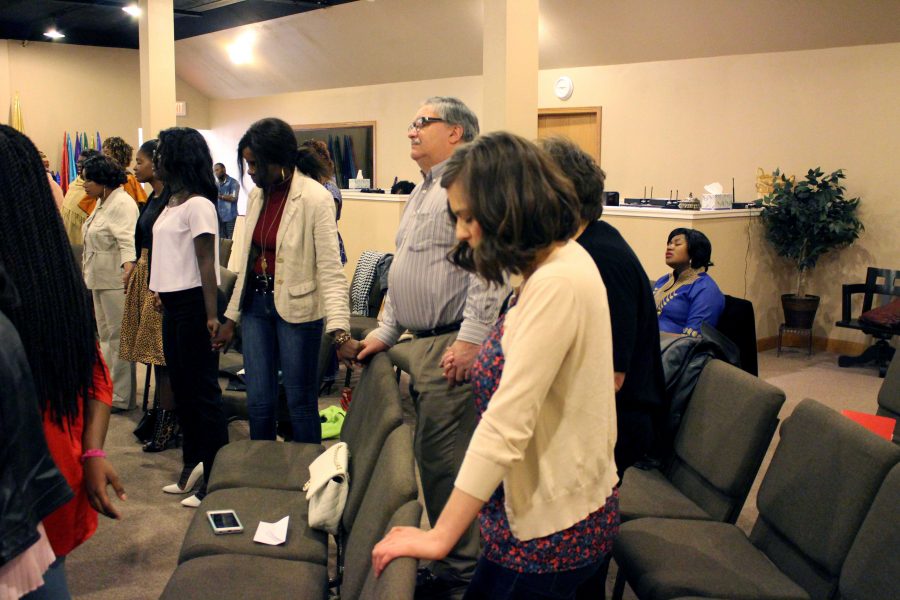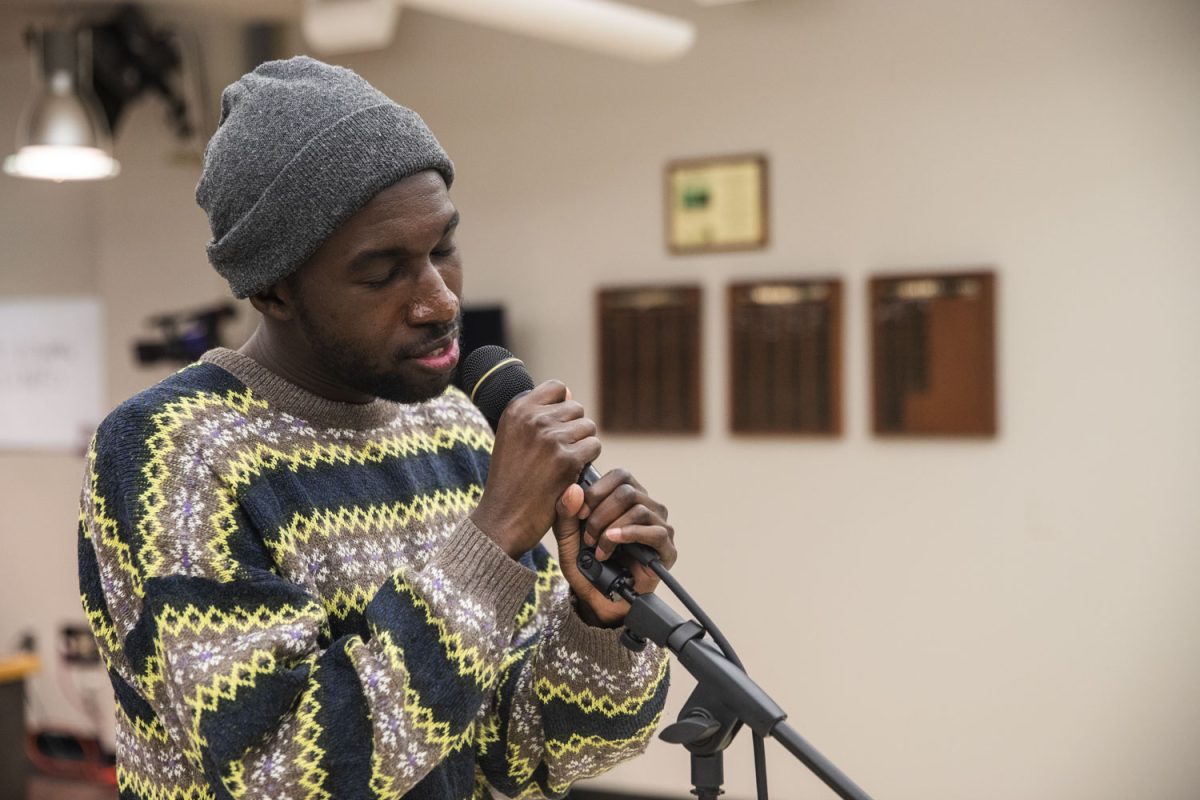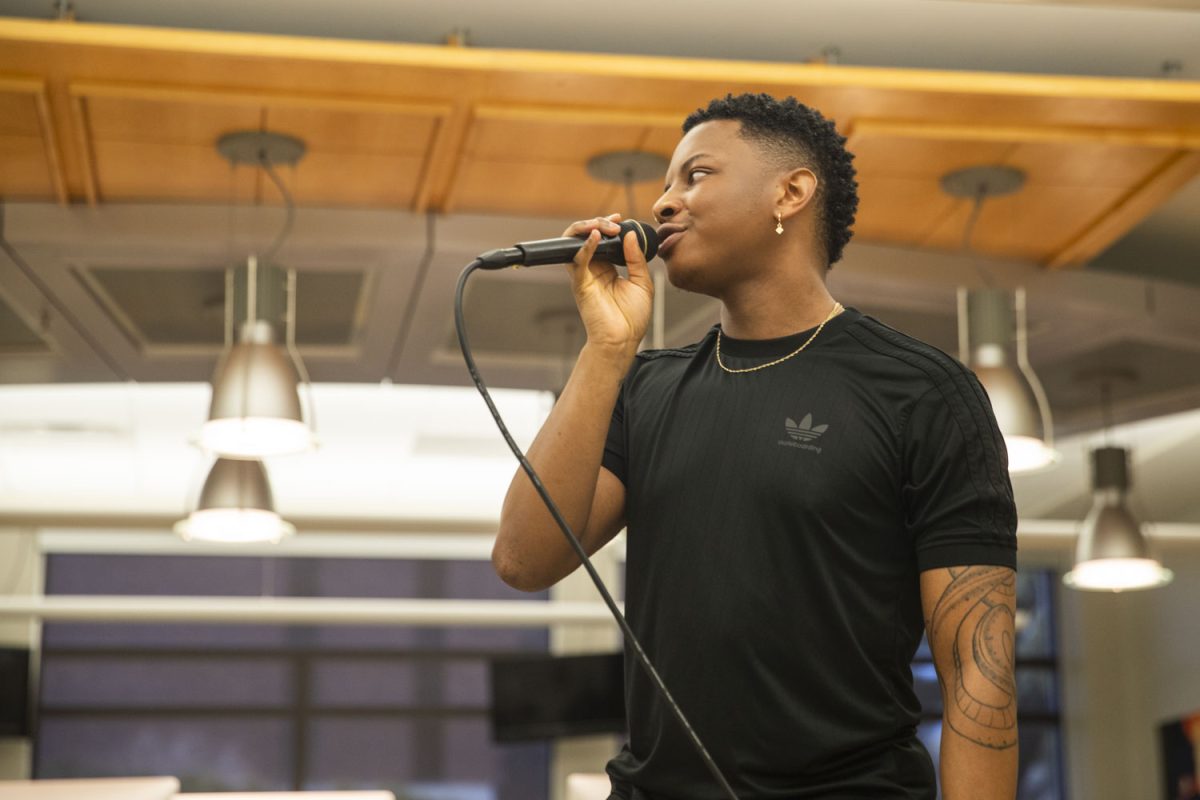In its third month, an Iowa City Friendship Exchange program is already creating cross-cultural understanding.
By Lily Abromeit
A pale 2.5 centimeter-long faded scar on his left forearm.
This mark is all the physical evidence Birindwa “Alex” Magambo has to show for his fight in escaping the Democratic Republic of Congo 15 years ago.
The 51-year-old lifts his sleeve slightly, rubbing the small scar, and reaches his arm across the table so Megan and Deb Yoder can see it more closely.
Then, he launches into a story that to them seems unbelievable; a story full of details about a kidnapping in the Democratic Republic of Congo, an escape to a different country, and the path to eventually becoming a refugee in the United States.
The meeting of these local residents is not simply happenstance: the two families are part of a new Friendship Exchange program through IC Compassion in Iowa City that aims to pair refugee or immigrant families with Americans. The Yoders and Magambo were first introduced at the program’s second exchange meeting in late March.
The program helps both families connect with fellow Iowans — native or new to the state.
•••
“I came from Congo,” Magambo said, retelling his story later. “In 2001, I went to Kenya, and before I went to Kenya, some people wanted to kill me because of the word of God.”
Listen as Birindwa “Alex” Magambo tells the story of escaping the Democratic Republic of Congo 15 years ago.
According to the U.S. Department of State, the Democratic Republic of Congo was the center of the African World War, which lasted from 1997-2003 and led to the deaths of more than 5 million people. The Department of State reports that religious discrimination was common, as well as accusations of witchcraft.
Magambo, a preacher who practices Christianity, said he told people not to believe in the witchcraft, that it was evil.
“So somebody went to tell them about what I’m saying, so they came in my house, and they wanted to kill me,” he remembers. “They came with a knife, they wanted to stab me on my neck, and I [lifted my arm to cover my neck], and the knife entered [my forearm].”
Magambo says the group then took him to a big forest, a place he didn’t know, about 40 miles from where he lived, in Bukavu.
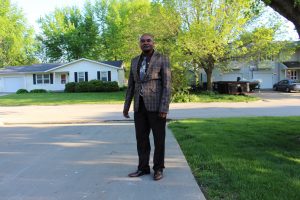
“And then, in the middle of the night … they heard voices of some people passing by, and they left me with somebody, and the other people went to go look,” he said. “And then after some two or three minutes, that guy went to ease himself, and when I saw that he went to ease himself, I said ‘God, help me. I’m gonna run. If they’re gonna shoot me, let me die. But I’m gonna try.’
“So I ran away. I ran, I ran, I ran, and then I heard them saying, ‘Where is he? Where is he?’ so I hid myself. When I was hidden, I was not breathing, not doing any movement, and then they passed by.
“In the morning, I saw the light coming, and then I looked around, and I didn’t see anybody.”
As he tells his story to the Yoders for the first time, with the perfect balance between a serious stare and a quick grin, they stay still, only the occasional slow shaking of their heads in disbelief interrupting his story.
Birindwa “Alex” Magambo escaped the Democratic Republic of Congo years ago but now his family is in danger. He explains why:
Magambo and his seven-person family now live in North Liberty. The Yoders are a mom, dad, and daughter family from Kalona. Deb and her daughter Megan work at the University of Iowa, and Bob Yoder is a Washington County supervisor who owns and operates a welding business in Kalona.
But despite their experiences on continents 7,668 miles away from each other, they share a common bond: Both families practice Christianity.
“For me, I prayed,” Magambo recalls later. “I said, ‘God help me, that family that I’m going to meet with, let it be a Christian family.’
“By good luck, when I met with them, even they were praying that God could help them meet a Christian family.”
Creating a cultural exchange
IC Compassion launched the exchange program in February. Since then, it has fostered 10 exchanges, whether among families, a group of friends, or individuals.
IC Compassion is a faith-based 501c3 nonprofit organization that operates in a brick Church of the Nazarene building in Iowa City. The church provides the space and funding, and the organization gets funding from other area churches as well. Although it is connected to Christianity, the volunteers or clients don’t have to practice a specific religion. The organization aims to bring together culturally diverse communities and sponsors many programs, such as a food pantry, tutoring services, ESL classes, low-cost legal immigration services, citizenship classes, and now, the exchange program.
Megan Schmidt, an Americorps service member who works at IC Compassion, said originally, the program was called a “Family Exchange,” but the members received a lot of interest from individuals or groups of friends wanting to participate, so they changed the name and the criteria to make it a “Friendship Exchange.”
The program goals are three-fold: to increase an awareness of cultural differences, to encourage cross-cultural relationships that will be long lasting, and to inspire a desire to develop new skills, hobbies, or understanding.
“There are so many nuances of culture that are hard to figure out unless you have a relationship with the other culture,” Schmidt said. “[We were] also hearing the needs of finding area resources and realizing that this could be a natural way to do that.”
Stephanie Getting, another Americorps volunteer, said there are so many needs in the community that IC Compassion can’t do it all alone, so this exchange program was one way for them to share the workload while also hopefully having an effect on the way people in the community view refugees and immigrants.
“I think it’s one step of many … for the community to break down those barriers,” Getting said. “It isn’t meant to be a mentorship … because we both have different things to bring.”
The Church Visit
The Sunday after they meet, the Yoders are first to arrive at Solid Rock Christian Center, where Magambo preaches in Coralville, for the 1 p.m. service.
A few minutes later, Magambo, his wife, and his six children all tumble out of a red minivan, dressed in sparkling skirts, heels, and, in the case of his wife, a traditional Congolese dress. Steaming Crock Pots in hand, they scurry into the church, chatting and laughing all the way to the back, where they set up food for the potluck following the service.
After more people arrive, Magambo picks up the electric guitar and the service begins.
“If you wanna dance, dance. If you wanna jump, jump,” Magambo calls out through the microphone.
At first, the Yoders are visibly taken aback. They look around with wide eyes at the children running around, women singing loudly into microphones throughout the crowd, and notice the young girls Facebook Live streaming the whole thing.
But soon they smile and start to sway, attempting to read the English words projected on a screen behind Magambo as he and another man call out in Swahili.
Most of the service continues this way. Singing with the band is interspersed with individual praising done out loud through the microphones, the women and men bent in half or kneeling in front of their chairs. It’s a potpourri of spiritual sound, full of feeling and meaning.
About halfway through the two-hour service, they make introductions of all the visitors to the church that day. Megan Yoder introduces herself and her parents and explains they are guests of Magambo. Magambo gushes about how happy he is to have them there, and minutes later, his wife and other members of the congregation are wrapping all of the Yoders in big communal hugs.
When the service ends, the party isn’t over. Everyone files over to the buffet and piles their plates full of food. The Yoders attempt to ask what it is they are eating but eventually just give in and take samples of everything.
“I guess you could say it was kind of like culture shock but in a really good way,” Megan Yoder, 28, said about the experience. “The music was different, but it was still similar because I noticed we were singing a lot of the same praise and worship songs that I sing at my church.”
Much like right after the service, Deb Yoder had trouble finding the words to explain the experience a few weeks later.
“Oh boy, how do I say that?” she said to herself quietly. “I guess how I would say it is, I don’t know what the word is, but they are really thanking and praising God because of all the obstacles they’ve been through, and we take it for granted, but we’re worshiping the same God.
“As for the message, it’s the same message of Christ.
“It was definitely a cultural immersion … but we could still see there that we were so much alike.”
Understanding the other side
About a month after being paired with Magambo and his family, Yoder, who is in her early 60s, said the entire experience has been more eye-opening than she expected.
“Just to be able to share between our families, it’s not just that we’re here to help,” she said. “It gives us greater understanding and appreciation.
“It makes us more aware of what’s going on in the U.S. but also makes us more compassionate for the nations of the world.”
During both of the first two exchange introduction events, including the one for Magambo and the Yoders, Sunday Goshit gave an introduction speech.
Goshit is an immigrant from Nigeria who works with IC Compassion during these types of events to try to help the two groups understand each other, saying things such as: “While other people run away from it, you are facing it head on.”
During the second event, Goshit had the attendees do an exercise. They filled out four boxes — one with names of their immediate family, one with names of extended family and close friends, one with a list of small items, such as cellphones and photos, and one with larger items, such as houses, cars, and favorite places.
Then, he had everyone cross out each item and name one by one, explaining that when you are a refugee, and sometimes when you are an immigrant, you leave all these things behind and most likely never see them again.
This exercise hit Deb Yoder hard.
“It brought tears to my eyes,” she said, tears springing back up as she thought back on the memory. “When you start to cross through, I guess my eyes were never open to that.
“It told me, yeah, we need to be here.”
Many families are spoiled in the U.S., she said, and people don’t understand what it would be like to be forced to leave.
“[There’s] that idea that these refugees come in, and they should just be happy, but we have no idea of their loss,” she said.
According to data provided by the Office of Refugee Resettlement, the number of primary refugee arrivals has gradually increased since 2010 in Iowa. In 2015, the latest data available, 787 refugees were first resettled in Iowa. These refugees came from 23 different nations; the most from Burma/Myanmar at 38 percent, followed by the Congo at 10 percent.
Tracking of refugees begins when they are first resettled in the U.S. However, Schmidt said, it’s difficult to find concrete numbers on how many refugees are in one place because many move away from the city or state. This is called secondary resettlement, and tracking does not happen during this stage. Schmidt said because of this, there are no accurate numbers for refugees in Johnson County.
“We’ve heard estimates ranging from 500 to 3,000,” she wrote via email. “Anecdotally, I can tell you that for our Refugee RISE program [an Americorps program that provides services to refugees], the majority of our clients are from the Democratic Republic of Congo or Sudan.”
A tool for refugees
Magambo said programs such as IC Compassion and the Friendship Exchange can be very helpful tools for refugees.
Sometimes, he said, refugees can go astray, break the law, or simply be confused because they just don’t understand all the rules and customs most Americans take for granted.
“It helps people to be together, even though the cultures are different, but it’s [also] good because sometimes there are some refugees who come here and when they come here, they lose everything, They don’t know what to do,” he said. “But when they meet with the citizens of the United States, they may be happy because those people, they know everything; they know the culture.”
The main goal of the program can be seen accomplished in Magambo’s experience.
“To me, to be with that family, it’s to exchange the cultures,” he said. “How American culture is and how African culture is and to combine them together and see how [they are]. Because now that I’m here, I’m trying to learn American culture.”
Magambo said he doesn’t know what to think about things such as the travel ban or animosity toward refugees and immigrants because, as he said, you never know why people are doing what they are doing.
“Maybe [government officials] know why they are doing that so we cannot judge them, but maybe they are doing something good for refugees,” he said. “That’s what I can say. Maybe they are trying to do something good for those refugees and the people in the United States.”
What is your favorite thing about living in Iowa?
Making connections
The Friendship Exchange program is open to any immigrant or refugee family, regardless of how long they have been in the U.S.
Magambo and his family have been in the U.S. for six years and in Iowa for almost five.
In fact, Alex Magambo, his oldest son, and his youngest four daughters became U.S. citizens in February 2016. His wife and eldest daughter are in the middle of the process right now.
This surprised Deb Yoder at first.
“Why decide to participate now when you’ve been here for years?” she said. “But seeing obstacles and challenges they face when getting here, maybe that’s too soon.
“Maybe it’s just so overwhelming at first.”
To her, the status doesn’t matter.
“Whether you connect with the refugee family from Day 1 when they land [in the U.S.], or you connect a year or two later, it’s still going to have an impact,” she said. “On you and the refugee family.”
The future of the program
On Friday, IC Compassion will host the third kickoff event to introduce new exchanges.
Getting said they want to be able to improve the kickoff events each month and give the groups tools to see the relationship succeed.
There are similar programs around Iowa City and the state they can draw ideas from. Friends of International Students is one at the UI focused on pairing students. EMBARC in Waterloo and EMBARC in Des Moines also have similar programs. Schmidt said Catherine McCauley Center in Cedar Rapids is launching a similar program and is using IC Compassion’s exchange for inspiration.
“We want it to be scalable, we want it to be able to grow,” Getting said.
Deb Yoder doesn’t seem to be worried about the program’s success, she just wants to continue to participate.
“[These programs] are like friendships,” she said. “They take time.”




